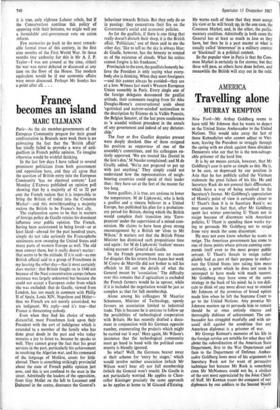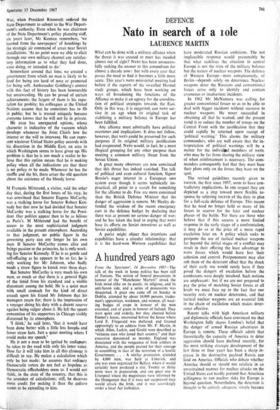Travelling alone
AMERICA MURRAY KEMPTON
New York—Mr Arthur Goldberg seems to have told Mr Johnson that• he wants to depart as the United States Ambassador to the United Nations. This would take away the last of those Kehnedyites who cannot adjust to Viet- nam, leaving the President .to struggle through the spring with no cloak against those dissident Democrats who say that he is the non-salvage- able prisoner of the hard line.
If is by no means certain, however, that. Mr Goldberg's case is quite as simple as this. He is, to be- sure, so 'depressed by our position in Asia that he has publicly called the Vietnam stalemate the great failure of his life. He and Secretary Rusk do not conceal their differences, which have a way of being resolved in the Secretary's favour. Mr Goldberg's appreciation of Hanoi's point of view is certainly closer to U Thant's than it is to Secretary Rusk's; we may assume in fact that, after Mr Goldberg spent last winter convincing U Thant not to resign because of discontent with American policies, U Thant is spending these weeks try- ing to persuade Mr Goldberg not to resign from very much the same discontent.
He may not even know whether he wants to resign. The American government has come to one of those points where private cunning com- mends itself even to the most proper public servant. U Thant's threats to resign rather plainly had as part of their purpose to embar- rass the United States into taking him more seriously, a point which he does not seem in retrospect to have made with much success. Mr Goldberg may have some of the same strategy in the back of his mind; he is too deli- cate to think of any more direct way to remind Mr Johnson of the promises of broad option made him when he left the Supreme Court to go to the United Nations. Any promise Mr Johnson musters up 'to persuade him to remain should be at once entirely sincere and thoroughly dubious of achievement. The am- bassador has struggled manfully and with un- usual- skill against the condition that any American diplomat is a prisoner of war.
Mr George Kennan's memoirs of his life in the foreign service are notable for what they tell abdlit the subordination of the American State Department, first to the War Department and then to the Department of Defence. Ambas- sador Goldberg loses most of his arguments to Secretary Rusk not for want of persuasive technique but because Mr Rusk is something even Mr McNamara could not be, a civilian of the sort most appreciated by the Joint Chiefs of Staff. Mr Kennan traces the conquest of our diplomats by our soldiers to the Second World
War, when President Roosevelt ordered the State Department to submit to the War Depart- ment's authority. Even when he was chairman of the State Department's policy planning staff, six years later, Mr Kennan remembers, `we learned from the newspapers' of bombings by the strategic air command of areas near Soviet installations. 'At no point were we able to elicit through our own military channel any satisfac- tory information as to what they had done, were doing, or intended to do.'
Somewhere around that time, we created a government from which no man is likely to be fired for being too hard of nose or promoted for being soft. Ambassador Goldberg's contest with this fact of history has been honourable but unrewarding. He can be proud of certain achievements; the largest of them is his repu- tation for probity; his colleagues at the United Nations assume that he sometimes has to fib in public; but he is trusted uniquely because everyone knows that he will not lie in private.
He even has unexpected options, whose character is indicative of the vacuum which develops whenever the Joint Chiefs lose the interest or the will to intervene. He can repre- sent whatever United States policy accords.with his discretion in the Middle East, an area in which Washington seems to have given up. His problem is that he is too much a realist to be- lieve that this option means that he is making policy when all the indications are that there is no policy to be made. Whenever he has the snaffle and the bit, there arises the old question about the existence of the bloody horse.
M Francois Mitterand, a visitor, said the other day that, during the first hours of his stay, he was convinced that Senator Eugene McCarthy was a stalking horse for Senator Robert Ken- nedy but that now he had decided that Senator McCarthy was a stalking horse for the Presi- dent. Our politics appear then to be as bilious as Paris's. M Mitterand had the benefit of access to the most sophisticated judgment available in the present atmosphere. According to that judgment, no public figure in the governing party can any longer be his own man. If Senator. McCarthy comes alive and brings passion to the primaries, he is only work- ing for Senator Kennedy. If he is as gentle and self-effacing as he appears to be so far, be is only working for Mr Johnson, who badly needs a straw figure to knock over these days.
But Senator McCarthy is very much his own man, so much so that there is a general flight of the timid from his standard and a visible discontent among the bold. He is a quiet man with small stomach for the kind of direct assault upon his friend Mr Johnson that, his managers yearn for; there is the impression of a voyager doing his duty with a decent reserve against being vulgar about it. He left the recent convention of his supporters in Chicago visibly distressed by its atmosphere.
'I think,' he said later, `that it would have been done better with a little less hoopla. and fewer straw hats. Just a quiet meeting where I could make my speech.'
He is not a man to be ignited by audioces; he takes to the road with only his inner voice. How far it will take him in all this clamour is difficult to say. He makes a calculation which only he has made: he assumes that ordinary Democratic voters do not feel as hopeless as Democratic officeholders seem to. I would not think, in the state of the country, that this is the soundest of calculations; still, he deserves more credit for making it than the culture seems to be extending to him.



































 Previous page
Previous page